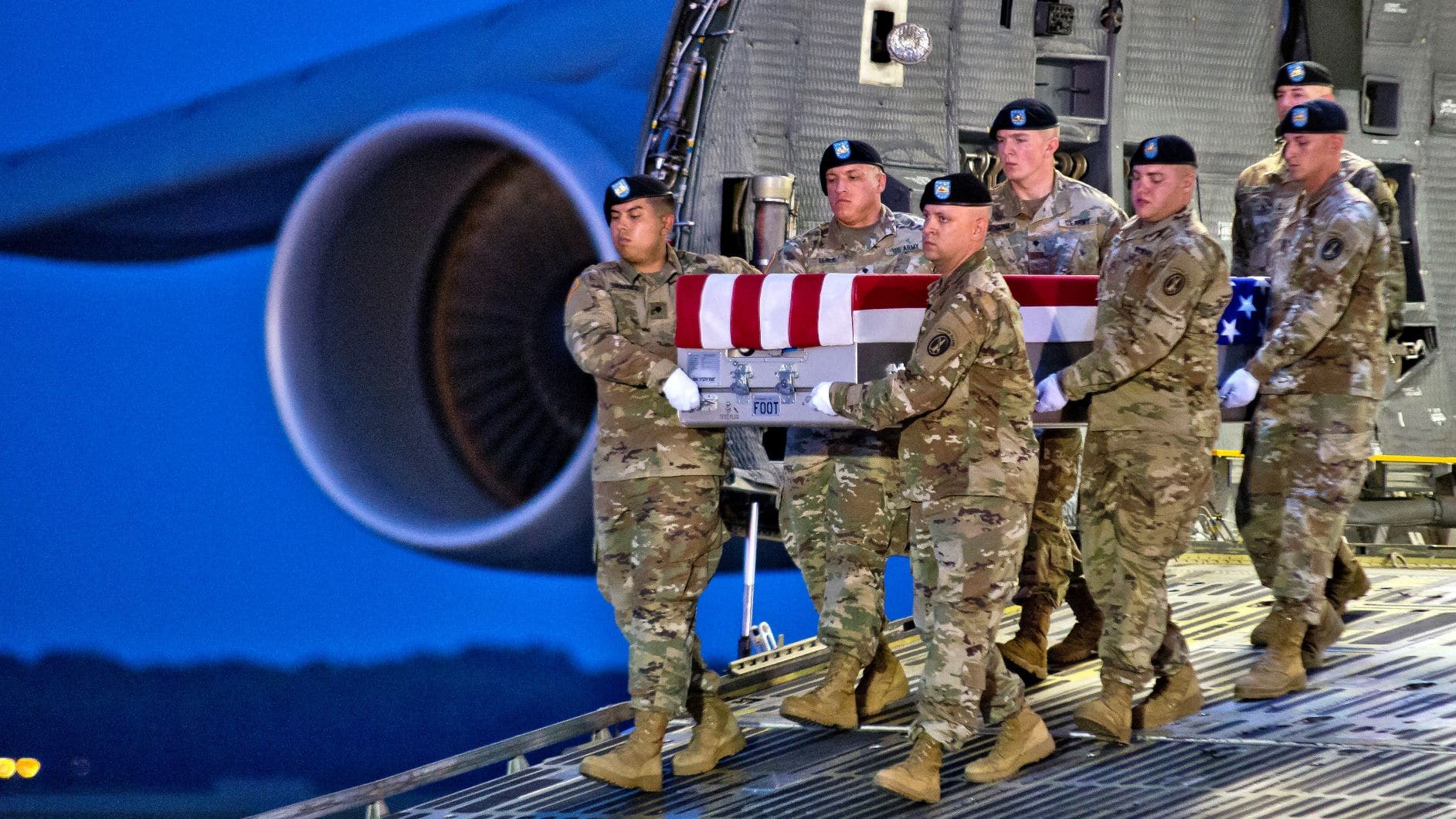The U.S. wants to end its longest war and withdraw from Afghanistan—called by some the graveyard of empires. But a May 1 deadline looks uncertain.

U.S. military carry the casket of a soldier killed in Afghanistan, Dover, Delaware, 12 June 2017. (EPA-EFE/SCOTT SERIO)
The United States wants to end its longest war ever by pulling its remaining troops out of Afghanistan after two decades of fighting and 4,000 American deaths.
But withdrawal by May 1, a target date set in peace talks last year, looks far from assured, raising the prospect that U.S. military forces will remain in the South Asian country where, time and again, foreign forces have met defeat at the hands of determined Afghans.
U.S. forces, supported by allies, invaded Afghanistan soon after al-Qaeda militants attacked the United States on September 11, 2001 and killed nearly 3,000 people.
The United States said the goal of the invasion was to dismantle al-Qaeda and deny it a base of operations by removing the Islamist Taliban from power.
Last year, while Donald Trump was U.S. president, an agreement for Washington to withdraw its last troops by May 1 this year was drawn up in a meeting in Doha between the United States and the Taliban — but without any representatives from the Afghan government.
Under pressure from an American public that wants out of Afghanistan, U.S. President Joe Biden is deciding whether to meet the May 1 deadline to withdraw the last 2,500 American troops. The new U.S. leader said recently that it will be hard to meet the deadline despite Taliban threats of more violence if it is not.
“That was not a very solid agreement … that the former president worked out,” Biden said last month.
U.S. does not want insurgents taking power again in Afghanistan.
Biden’s administration is trying to build international pressure on the Taliban and U.S.-backed Afghan President Ashraf Ghani’s government to reach a peace agreement and a ceasefire before the deadline. The U.S. State Department said this week that preparations were underway for a conference in Turkey to help Afghan negotiators make progress in their talks.
Under the Doha agreement, the Taliban pledged an immediate end to attacks on U.S. troops but did not promise a halt to attacks on Afghan troops, who face heavy losses.
A land-locked country of 38 million people, Afghanistan is located at a volatile crossroads where the Islamic world meets Hindu and Chinese civilizations. Nuclear powers India and Pakistan have long sought influence over Afghanistan.
Washington and its allies fear that if Taliban insurgents take power again in Afghanistan, they could provide a haven for terrorists to plan attacks on Western targets.
But like each of his predecessors since the 2001 invasion, Biden is struggling to bring home troops while ensuring the Taliban do not seize power, abuse human and women’s rights or allow international terrorists a base.
Some call Afghanistan “the graveyard of empires.”
Like the U.S. forces and their North Atlantic Treaty Organization allies, a series of foreign armies over centuries have struggled in Afghanistan.
Around 320 BC, Alexander the Great occupied Afghanistan, then called Bactria, but he was unable to subdue the Afghans. In the 19th Century, British troops were defeated by the Afghans, who picked off the retreating army.
Next, it was the turn of the Soviet Union, which invaded in 1970 with modern helicopter gunships, tanks and top communications gear. By 1989, the Soviets, bloodied by U.S.-supplied Stinger missiles, had had enough and went home, leaving victorious Afghan Mujahideen factions to fight each other.
The Taliban faction, backed by Pakistan, seized the country and allowed al-Qaeda leader Osama bin Laden to train militants who attacked the United States on September 11, 2001. Under the Taliban’s fundamentalist rule, Afghanistan became one of the two last countries to have polio.
William Byrd, an expert at the U.S. Institute of Peace who spent four years in Afghanistan’s capital, Kabul, working for the World Bank, said the United States made a mistake after ousting the Taliban in 2001.
“Instead of making a peace deal with the defeated Taliban and providing them a dignified surrender, the U.S. took a purely counter-terrorism approach, refusing to talk to them and sending some to Guantanamo, Cuba,” Byrd said. “In the meantime, the old Mujahideen warlords who were widely resented for their depredations, were allowed to become entrenched.’’
Would the return of the Taliban to power prove, again, that Afghanistan is the graveyard of empires? “The Afghans outlasted those empires,” Byrd said. “It was not worth the trouble to hang on.”
Fiercely independent Afghans have always resented foreign invaders.
From a peak of around 100,000 U.S. troops after the 2001 invasion, only 2,500 remain, propping up a tenuous Afghan government against Taliban attacks.
Over two decades, U.S. and NATO allies have invested billions of dollars and built roads, schools, clinics and power plants. A goal has been to transform a society riven by religious and ethnic rivalries into a model democracy.
But the fiercely independent Afghans have resented foreign boots on their soil.
Time and again, the Afghans have defeated invading armies with their knowledge of the mountainous terrain and their determination to repel other cultures. When I visited Afghanistan before the wars began in 1979, I was welcomed in cities and villages as a visitor and a tourist. But after the foreign troops came in, the Afghans were not so friendly.
Factions dividing Afghans include Pashtun, Hazara, Tajik, Uzbek and others. Some are Shiite, and others are Sunni. They do not always get along. Neighboring Iran supports Shiite factions. Pakistan backs Pashtun in part because some 20 million of them live in Pakistan.
Even though U.S. and NATO aid teams built roads, schools and clinics, when contractors returned to fortified compounds, the Taliban descended from the hills to punish collaborators, burn girls’ schools and force farmers to grow opium.
Can Afghanistan unify without foreign troops on their soil?
One question is whether the United States will abandon Afghanistan again as it did in 1990 to the powerful internal, ethnic, religious and regional rivalries going back thousands of years.
A fear in the West is that if the Taliban take power, they could once again invite terrorists bent on attacking American and European cities.
The U.S. military has powerful weapons, including drones and fighter jets, that could help Afghan troops fend off a Taliban attempt to seize Kabul and other cities. But public sentiment in the United States favors ending America’s longest war.
Some favor pulling out of Afghanistan as the United States did in Vietnam in 1975. Others say Washington cannot abandon Afghanistan for a second time to civil warfare.
If U.S. and NATO troops depart, will drone strikes, military assistance and foreign aid enable the Afghans to unify their country and end decades of war?
Three questions to consider:
- Why did the United States invade Afghanistan in 2001?
- Why do some call Afghanistan “the graveyard of empires”?
- How would you ensure a peaceful and unified Afghanistan?

Ben Barber has reported since 1980 from the Middle East, Asia, Africa and Latin America. He has written for Foreign Affairs, Christian Science Monitor, USA TODAY, Baltimore Sun, Toronto Globe and Mail, American Legion Magazine, Huffington Post and others. He was State Department Bureau Chief for the Washington Times and editor of the newsletter of USAID for seven years.
